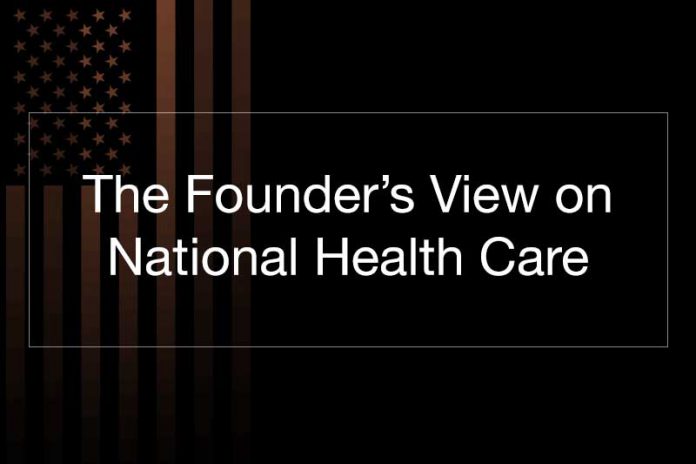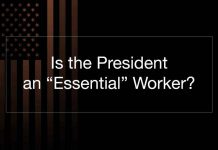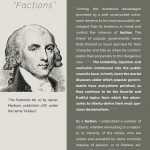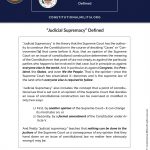Last Updated on January 20, 2021 by Constitutional Militia
Confronted with the strident debate on national health-care legislation, one must be amazed at how often the opponents of the monstrosity being cobbled together by the legislative Doktors Frankenstein in the Disgrace of Columbia fail to appeal to constitutional fundamentals.
In The Federalist No. 57, James Madison relied on a constitutional principle that, for all intents and purposes, disposes of any and every argument in favor of the present bills before Congress. Recall that a main purpose of The Federalist Papers was to refute claims that the Constitution delegated too much power to the General Government, at the expense of the States and WE THE PEOPLE. In No. 57, Madison addressed the contention that “the House of Representatives * * * will be taken from that class of citizens which will have least sympathy with the mass of the people, and be most likely to aim at an ambitious sacrifice of the many to the aggrandizement of the few”.
Madison offered a number of reasons why this argument was invalid. But most relevant here was a fifth circumstance in the situation of the House of Representatives, restraining them from oppressive measures, that they can make no law which will not have its full operation on themselves and their friends, as well as on the great mass of the society. This has always been deemed one of the strongest bonds by which human policy can connect the rulers and the people together. It creates between them that communion of interests and sympathy of sentiments of which few governments have furnished examples: but without which every government degenerates into tyranny. If it be asked, what is to restrain the House of Representatives from making legal discriminations in favor of themselves and a particular class of the society? I answer: the genius of the whole system; the nature of just and constitutional laws; and, above all, the vigilant and manly spirit which actuates the people of America—a spirit which nourishes freedom, and in return is nourished by it. If this spirit shall ever be so far debased as to tolerate a law not obligatory on the legislature, as well as on the people, the people will be prepared to tolerate anything but liberty. [Emphasis supplied.]
Precisely why, as a matter of constitutional law, can Congress “make no law which will not have its full operation on themselves and their friends, as well as on the great mass of the society”? Because part of “the genius of the whole system” and “the nature of just and constitutional laws” require equality in all legislation that is capable of equal application. The Preamble sets as one of the Constitution’s goals “to * * * promote the general Welfare”—which, because every power of Congress must be interpreted and applied in conformity with the Preamble, entails that no law that can be written so as to reach Americans in general can be tricked out with “legal discriminations in favor of [Members of Congress] and [any other] particular class of the society”. The Constitution deems the ruling criterion of “the general Welfare” so important that it repeats that requirement in Article I, Section 8, Clause 1, which delegates to Congress the “Power to lay and collect Taxes * * * to pay the Debts and provide for the * * * general Welfare of the United States”. So, any legislation which involves taxation, spending, or both must be equally applicable to all similarly situated Americans.
Now, as is self-evident, a scheme for “national health care”— involving taxation, spending, or both—can be written so as to apply to everyone, on precisely equal terms, designed to provide precisely equal benefits for and to impose precisely equal burdens upon Members of Congress, the President, and public officials and employees of the General Government, as well as “Joe Doaks”, “Ma and Pa Kettle”, and every other ordinary American. Yet the national health-care bills before Congress do not provide for universal and equal benefits for and burdens upon all Americans. No, indeed. Members of Congress—“and their friends”, as Madison so delicately put it— are excluded from these bills, and allowed to retain for themselves especially favorable health-care coverage unavailable at any price to average citizens.
On the face of it, then, the present national-health care bills, being (in Madison’s formulation) “[proposed] laws not obligatory on the legislature, as well as on the people”, are the products and the making of nothing less than tyranny. As the English political philosopher John Locke defined it,
Tyranny is the exercise of Power beyond Right, which no Body can have a Right to. And this is making use of the Power any one has in his hands; not for the good of those, who are under it, but for his own private separate Advantage.
’Tis a Mistake to think this Fault is proper only to Monarchies; other Forms of Government are liable to it, as well as that. For where-ever the Power that is put in any hands for the Government of the People, and the Preservation of their Properties, is applied to other ends, and made use of to impoverish, harass, or subdue them to the Arbitrary and Irregular Commands of those that have it: There is presently becomes Tyranny, whether those that thus use it are one or many.
An Essay Concerning the True Original, Extent, and End of Civil Government (London, England: Awnsham Churchill, 1690), §§ 199 and 201.
Even earlier, the eminent theologian and jurist Francisco de Vitoria—from the University of Salamanca in Spain—had held to the same definition: “Herein, indeed, is the difference between a lawful king and a tyrant, that the latter directs his government towards his individual profit and advantage, but a king to the public welfare[.]” De Iure Belli (1557), quoted in James Brown Scott, The Catholic Conception of International Law (Clark, New Jersey: The Lawbook Exchange, Ltd., 2008), at 38.
So, confronted with this crescent tyranny, what should Americans do? The first step must be to revive “the vigilant and manly spirit which [in the past] actuate[d] the people of America—a spirit which nourishes freedom, and in return is nourished by it”. With that spirit rekindled, anything is possible.
©2010 Edwin Vieira, Jr. – All Rights Reserved.




































